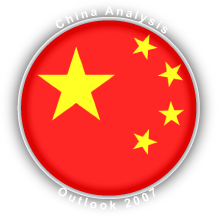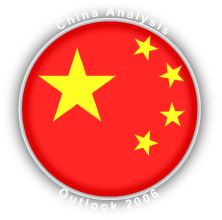Caterpillar CEO Pitches Free Trade to Business Leaders at Executives’ Club asks whether the U.S. is at turning point with global economy in the balance—A lack of courage?
 James W. Owens, Chairman and Chief Executive Officer of Caterpillar Inc., beseeched U.S. business and government leaders to find the courage to save free trade. The speaker at the Executives’ Club of Chicago’s Global Leaders Series, Owens addressed a packed house at the Hilton Chicago on 16 October 2007. His speech was immediately followed by the Club’s Technology Conference at which CIOs advised their peers on the emerging role of the CIO in the “networked economy 2.0.” James W. Owens, Chairman and Chief Executive Officer of Caterpillar Inc., beseeched U.S. business and government leaders to find the courage to save free trade. The speaker at the Executives’ Club of Chicago’s Global Leaders Series, Owens addressed a packed house at the Hilton Chicago on 16 October 2007. His speech was immediately followed by the Club’s Technology Conference at which CIOs advised their peers on the emerging role of the CIO in the “networked economy 2.0.”
A Ph.D. economist with extensive global management experience, Owens made a very convincing argument that the U.S. and the global economy are at a turning point. It is time for the U.S. to lead by example to assure the continuance of the free trade juggernaut that has produced so much wealth in the world. If it fails, the world stands before the prospect of sharply curtailed trade.
Following […]
China Analysis and Outlook 2007 offers political insight into the global knowledge market.
 The Strategic Management Association, the Harvard Business School and the CDMA sponsored the 2007 China Outlook, which was given by Lyric Hughes-Hale, Founder China Online in Chicago 9 January 2007. Her presentation was preceded by David Hale’s 2007 Economic Forecast. The Strategic Management Association, the Harvard Business School and the CDMA sponsored the 2007 China Outlook, which was given by Lyric Hughes-Hale, Founder China Online in Chicago 9 January 2007. Her presentation was preceded by David Hale’s 2007 Economic Forecast.
As a long-time China watcher and analyst, Lyric has rare and unusual insights to which I’ll try to do justice before giving my observations. The Global Human Capital Journal also covered the 2006 China Outlook.
[…]
 Chinese Prescription for Healthcare Providers predicts that China is showing itself to be very innovative in health care by implementing market-based offerings. The TEDA International Cardiovascular Hospital, just outside Beijing, offers six levels of service, ranging from $6.70 to $3,200 per night, as reported in “Hospital Caters to China’s Wealthy and Poor” in The Wall Street Journal or the hospital website. The lowest class of service has patients sharing a small room with other patients while “first class” includes a suite with a private gym, a garden, massage chair and other amenities. Chinese Prescription for Healthcare Providers predicts that China is showing itself to be very innovative in health care by implementing market-based offerings. The TEDA International Cardiovascular Hospital, just outside Beijing, offers six levels of service, ranging from $6.70 to $3,200 per night, as reported in “Hospital Caters to China’s Wealthy and Poor” in The Wall Street Journal or the hospital website. The lowest class of service has patients sharing a small room with other patients while “first class” includes a suite with a private gym, a garden, massage chair and other amenities.
China has an aging population of 1.3 billion to whom the government is struggling to provide health care. It regulates the prices of medicine and subsidizes basic services at public hospitals, but most people do not have western-type insurance and end up paying a major portion of their health care. The stakes are high today to solve the health care problem, and they are getting higher as the population ages.
[…]
The TransAtlantic Partnership’s Implications for U.S., E.U. Economies summarizes coverage of the EEC International Conference—Talking with the Ambassadors of the World’s Largest Trading Relationship and the CEOs of Four Global Enterprises.
 Three eminent diplomatic leaders and CEOs from Baxter, Financial Dynamics, ITW and Philips briefed Midwest executives on the current status and future directions of the world’s largest trading relationship at the Executives’ Club of Chicago’s International Conference November 15. The half-day program featured several presentations, a CEO panel and a media round table. All speakers sought to impress upon the audience the pivotal importance of the transatlantic alliance for the United States and Europe, and most warned chief executives neither to take it for granted nor to be passive in the face of rising protectionism. Three eminent diplomatic leaders and CEOs from Baxter, Financial Dynamics, ITW and Philips briefed Midwest executives on the current status and future directions of the world’s largest trading relationship at the Executives’ Club of Chicago’s International Conference November 15. The half-day program featured several presentations, a CEO panel and a media round table. All speakers sought to impress upon the audience the pivotal importance of the transatlantic alliance for the United States and Europe, and most warned chief executives neither to take it for granted nor to be passive in the face of rising protectionism.
The fact that the importance of the E.U.—U.S. alliance had to be emphasized brought into sharp relief the relatively sudden rise of Asia as well as the shift from the Industrial Economy to the Knowledge Economy. Both megatrends pose opportunities and threats for the world’s largest economies and enterprises, and […]
The Silver Lining in India’s Infrastructure Gap posits that India’s poor infrastructure face force it to develop more lucrative Knowledge Economy assets.
India is often described as a mixed proposition with respect to its future promise. Although few would question its brilliance as a “burgeoning technology economy,” most people temper this with somber remarks about its lack of “infrastructure.” However, I will argue that India’s limitations with physical infrastructure will actually help India get further ahead than if it didn’t have such problems.
In the popular view (see Indian Raj and its quote of The Houston Chronicle), India’s technology expertise, language skills and legal sensibilities are its trump cards, but this is compromised by its lack of roads, transportation of all kinds, network infrastructure, electricity, and so on. High tech companies have to build their own generators and network infrastructure, and leading providers have created islands of world class capability to assure their global clients that they don’t depend on the country’s infrastructure. China, on the other hand, is generally seen as a paragon of world-class infrastructure, especially physical infrastructure. Woe is India.
[…]
China Analysis and Outlook 2006 reveals an emerging opportunity to rebalance economic and political influence.
 Part II of the 2006 Economic Forecast featuring David Hale (presented Part I) and Lyric Hughes-Hale. Here, I present my notes of Lyric’s talk, followed by my observations. Part II of the 2006 Economic Forecast featuring David Hale (presented Part I) and Lyric Hughes-Hale. Here, I present my notes of Lyric’s talk, followed by my observations.
Background: China’s development and situation are far more complex than U.S. news sources report. It has seen significant economic liberalization during the past 25 years, and it shows every sign of continuing on that trajectory. However, the country is politically conservative. There is no freedom of the press. That said, the authoritarian government may produce reform much more quickly than if China had been democratic because the democratic process often slows reform. China is far more open and engaged on the world stage than it has been in many years. […]
Surprises in the Emerging Chinese Consumer Market highlights the Internet-powered practice of consumer collaboration and group buying for discounts.
“Chinese Consumers Overwhelm Retailers with Team Tactics,” The Wall Street Journal, February 28, 2006 is a perfect example of how mature market assumptions can lead to surprises in emerging markets. Chinese consumers increasingly meet on the Internet chat rooms to plan and coordinate a group buying strategy for a type of good or even brand. Then they go to the retailer as a group to extract significant group discounts. This practice is known as tuangou, or team purchase, and can play havoc with companies’ pricing strategies and margins, to say the least.
[…]
Insight about Human Resources in China featured speakers with decades of experience on the ground in China and offered surprising experiences. The GSB (Booth) International Round Table hosted two Asia and cross-cultural experts 16 February 2006 at Gleacher Center, “Human Resource Challenges for Multinational Corporations in China.” As is my custom, I will summarize the salient facts of the session first, which will be followed by my analysis.
This discussion was led by Deborah Lauer, former VP Global Talent Supply at Motorola who spent six years in China, and Jeffrey Reed, a 20 year veteran of Asia who headed up Unilever-Best Foods joint ventures in Pakistan and China. The talk focused on MNCs’ (multinational corporations) human resource challenges in China, both from expatriate and local talent perspectives. Many of the ideas presented corresponded to the ITA Round Table led by Dr. Wolfgang Fürniß (see China: The New Economy).
[…]
Rare Legal and Business Insight into Offshore Countries and Regions describes Baker & McKenzie’s excellent webcasts focused on offshore business.
Depending on your business strategy, it may make sense to explore offshoring to several regions of the world to mitigate the risk that your partner might be affected by natural disasters or political upheaval. In fact, many offshore experts recommend a portfolio strategy for risk mitigation or operational effectiveness (follow the sun operations can reduce time to market) while meeting cost objectives.
[…]
China: The New Economy summarizes that, by any measure, China is a juggernaut in the early stages of flowering on the global stage: As a consumer market, it has the potential to be the largest in the world as the country is the most populous. As a hub of human capital in a knowledge economy, it will become an epicenter of service-based knowledge workers. As an ambassador of Southeast Asia, it will influence what will arguably be the deepest talent pool in the world. This will cause a reconfiguration of the world’s knowledge network.
[…]
|
|
 James W. Owens, Chairman and Chief Executive Officer of Caterpillar Inc., beseeched U.S. business and government leaders to find the courage to save free trade. The speaker at the Executives’ Club of Chicago’s Global Leaders Series, Owens addressed a packed house at the Hilton Chicago on 16 October 2007. His speech was immediately followed by the Club’s Technology Conference at which CIOs advised their peers on the emerging role of the CIO in the “networked economy 2.0.”
James W. Owens, Chairman and Chief Executive Officer of Caterpillar Inc., beseeched U.S. business and government leaders to find the courage to save free trade. The speaker at the Executives’ Club of Chicago’s Global Leaders Series, Owens addressed a packed house at the Hilton Chicago on 16 October 2007. His speech was immediately followed by the Club’s Technology Conference at which CIOs advised their peers on the emerging role of the CIO in the “networked economy 2.0.”
 The Strategic Management Association, the Harvard Business School and the CDMA sponsored the 2007 China Outlook, which was given by Lyric Hughes-Hale, Founder China Online in Chicago 9 January 2007. Her presentation was preceded by David Hale’s 2007 Economic Forecast.
The Strategic Management Association, the Harvard Business School and the CDMA sponsored the 2007 China Outlook, which was given by Lyric Hughes-Hale, Founder China Online in Chicago 9 January 2007. Her presentation was preceded by David Hale’s 2007 Economic Forecast. Chinese Prescription for Healthcare Providers predicts that China is showing itself to be very innovative in health care by implementing market-based offerings. The TEDA International Cardiovascular Hospital, just outside Beijing, offers six levels of service, ranging from $6.70 to $3,200 per night, as reported in “Hospital Caters to China’s Wealthy and Poor” in The Wall Street Journal or the hospital website. The lowest class of service has patients sharing a small room with other patients while “first class” includes a suite with a private gym, a garden, massage chair and other amenities.
Chinese Prescription for Healthcare Providers predicts that China is showing itself to be very innovative in health care by implementing market-based offerings. The TEDA International Cardiovascular Hospital, just outside Beijing, offers six levels of service, ranging from $6.70 to $3,200 per night, as reported in “Hospital Caters to China’s Wealthy and Poor” in The Wall Street Journal or the hospital website. The lowest class of service has patients sharing a small room with other patients while “first class” includes a suite with a private gym, a garden, massage chair and other amenities. Three eminent diplomatic leaders and CEOs from Baxter, Financial Dynamics, ITW and Philips briefed Midwest executives on the current status and future directions of the world’s largest trading relationship at the Executives’ Club of Chicago’s International Conference November 15. The half-day program featured several presentations, a CEO panel and a media round table. All speakers sought to impress upon the audience the pivotal importance of the transatlantic alliance for the United States and Europe, and most warned chief executives neither to take it for granted nor to be passive in the face of rising protectionism.
Three eminent diplomatic leaders and CEOs from Baxter, Financial Dynamics, ITW and Philips briefed Midwest executives on the current status and future directions of the world’s largest trading relationship at the Executives’ Club of Chicago’s International Conference November 15. The half-day program featured several presentations, a CEO panel and a media round table. All speakers sought to impress upon the audience the pivotal importance of the transatlantic alliance for the United States and Europe, and most warned chief executives neither to take it for granted nor to be passive in the face of rising protectionism. Part II of the 2006 Economic Forecast featuring David Hale (presented Part I) and Lyric Hughes-Hale. Here, I present my notes of Lyric’s talk, followed by my observations.
Part II of the 2006 Economic Forecast featuring David Hale (presented Part I) and Lyric Hughes-Hale. Here, I present my notes of Lyric’s talk, followed by my observations.